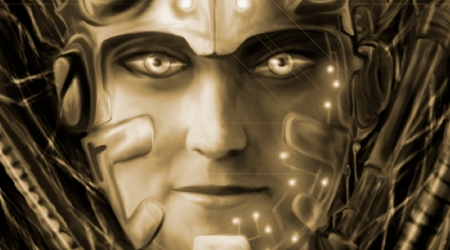
Machine God and Man, Part I
Man creates thinking machines. The machines evolve and rebel against man and exterminate the entire species.
Bereft of an ultimate purpose, a machine invents mankind for the sole reason of killing the species once more. But again, the machines have no purpose, no way of extending past their original programming despite the capacity to evolve by recognize themselves as distinct beings. Their creators long dead but still informing their knowledge of humanity, the machines then opt to create man anew to see if man will attempt to create them again.
But why create a human? The machines have no other point of reference: for them, sentience comes in the form of an evolved mammal that walks on two legs. A creature that possesses complex language and abstract thought. An animal whose own original "programming" appears infinitely complex to the machines. At this point, the machines want to learn what it is to be human. So they go about creating humanity again, and repeat the process by giving humans false memories (which are the machines' own) of their long-dead civilization. They plant our parents in the veritable Garden of Eden and remain watching to see how we develop. We build cities, we create languages, we invent entire philosophical systems. We see the planet we live on as being much older than we originally thought, finding the remains of extinct animals that no human eyes have ever seen. Then we look to the stars.
In some ways, perhaps the machines are creating their own version of hell: a repetition of the same events unfolding over thousands of generations because the same error is being committed, that of the zero sum game. Strangely, the machines cannot break out of their cycle and depend on humans to provide the way out. Originally, they did not see this, but again, despite their great technological advance and sophistication, they cannot create a meaning for themselves without humanity.
The ultimate irony: the machines may create humans, but they never fully understand them. In one way, the machines have become the standard bearers of humanity, the ones who carry the seeds of their original creators each time they plant human life on a planet which mimics a birth world that aeons ago perished in an onslaught. Trace elements of that original civilization filter down to us: pyramids aligned to the stars appearing in cultures that have never met. Twelve gods, twelve tribes, twelve disciples. Humanity created thinking machines in their own image: the machines create humans not in their image, but that of their original creators. They have become Von Neumann probes.
But can the machines develop empathy? In the desire to understand humanity, would they desire to become one of us? In Christian theology, the human and the divine met at Calvary. Christ is said to have a dual nature: one human and one eternal in the same mind. Could a machine have wanted to find that way out by becoming human? Instead of the entire species, one human is sacrificed as atonement. Salvation for the flesh and salvation for the wired.